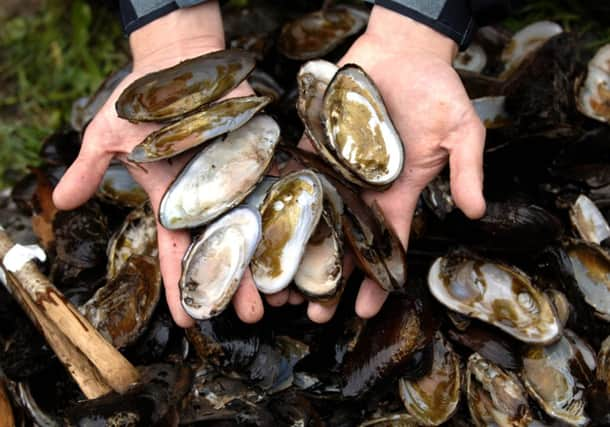Scheme launched to save Scotland’s pearl mussels


Scottish rivers remain a stronghold for the critically endangered species, which has vanished from much of Europe in recent decades.
But even populations north of the border are on the brink of extinction as a result of water pollution, engineering works in rivers and over-fishing by pearl hunters.
Advertisement
Hide AdAdvertisement
Hide AdNow a new scheme is being launched in an attempt to aid recovery of the river-dwelling bivalves, which have been protected by law since 1998.
Freshwater mussels are bigger and live much longer than their marine counterparts, with some specimens growing up to half a foot long and surviving for more than a century.
Conservationists hope the new Riverwatch campaign, which will see 16 surveillance projects rolled out at sites across Scotland by the end of 2015 as part of the Pearls in Peril scheme, will aid recovery of the mussels by clamping down on illegal activities affecting the species.
The first project will kick off in the Kyle of Sutherland on 15 September.
Patrols will monitor the Oykel and Evelix rivers, which contain sites designated as Special Areas of Conservation, and others such as the Cassley and the Shin.
“The freshwater pearl mussel is critically endangered and the populations in Scottish rivers are globally important,” said Natalie Young, Riverwatcher for Pearls in Peril.
“Pearl mussels live on the river bed and feed by drawing in water and filtering out fine particles, keeping our rivers clean.
“They are an important species ecologically as they keep water clean for other river wildlife like salmon and trout. And salmon and trout fishing is worth millions to the Scottish economy, so it makes sense to keep our river purifiers fit and healthy for future generations.”
Advertisement
Hide AdAdvertisement
Hide AdPolice Scotland’s Chief Inspector Colin Gough said: “Police Scotland welcome and support the Riverwatch scheme being launched in the Kyle of Sutherland, which can help to spread information to reduce crime against freshwater pearl mussels and encourage the reporting of illegal pearl fishing.
“Freshwater pearl mussels are an important part of a river’s habitat and are protected by law.”
He said officers would support river patrols and investigate any reports of crimes against pearl mussels, “undertaking enforcement action wherever possible”.
Illegal fishing of freshwater mussels usually takes place when river waters are low, in spring and summer, and generally in remote locations or areas that are hidden from view.
Fishing is often carried out by wading into the river, using a glass-bottomed bucket to find the molluscs and a cleft stick to retrieve them.
Mussels are killed and often dumped in piles on the river bank. Pearls are rarely found, but the practise has serious implications for the population and has led to extinction of the species in many rivers.
Over the past 100 years, the mussel has disappeared from more than a third of rivers where it once thrived.
It is an offence to intentionally or recklessly kill, injure or take pearl mussels and to destroy, damage or disturb pearl mussel habitats.
Advertisement
Hide AdAdvertisement
Hide AdThis includes unauthorised modification or engineering to the river and any activities causing excessive siltation or pollution.
Ms Young added: “Freshwater pearl mussels have historically been ‘fished’ for the pearl they may contain.
“But the mussels only very rarely produce pearls and pearl fishing can be devastating to the remaining pearl mussel populations.
“Protecting mussel populations is even more important following Hurricane Bertha-related spates and floods that scoured many river beds; dislodging mussels that were then left high and dry. In some locations the damage has been immense.”